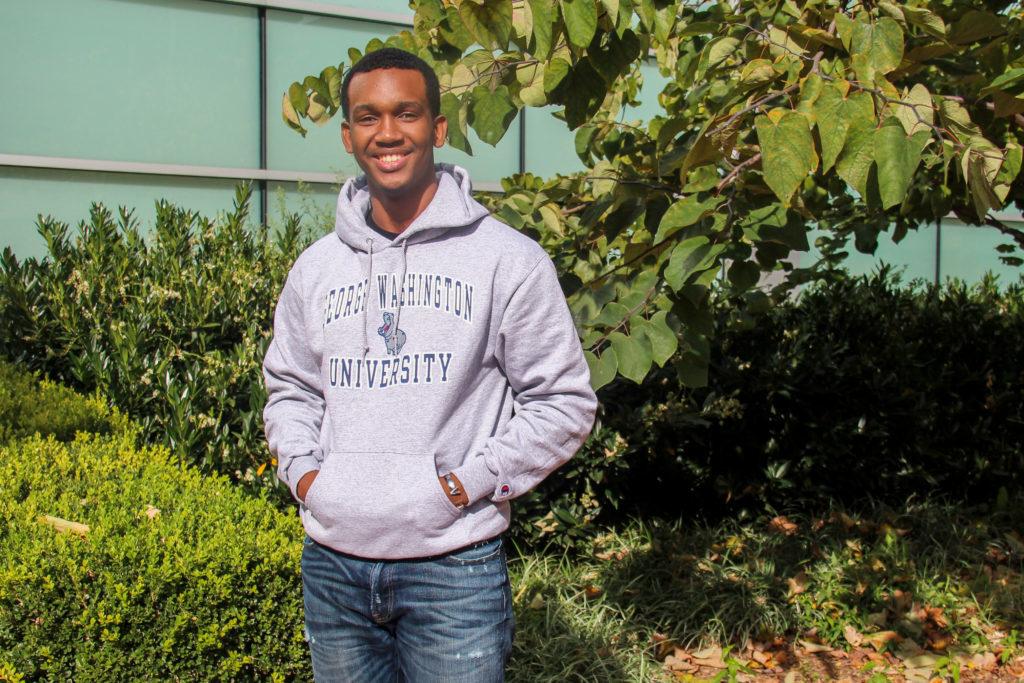Junior Bailee Dukes was in the District when Hurricanes Irma and Maria barreled through her home in St. Thomas, one of the U.S. Virgin Islands.
The day Irma hit last month, Dukes said she used a walkie-talkie application to communicate with her mother, who said the hurricanes were “the scariest thing she’s ever been through.” She said her mother told her to stay off social media to avoid seeing pictures of the destruction on the island. But she didn’t listen.
“It still hurts seeing pictures of places that I used to go to that are now unrecognizable or just gone,” she said. “When I spoke to my dad on the phone after the storm, I broke down. I never wanted to go home as much as I did in that moment.”
Although power hasn’t yet been restored to her home, Dukes said she was fortunate there was no structural damage and only the doors and windows needed to be replaced.
In the wake of the two hurricanes – which wreaked havoc on the Virgin Islands last month, damaging or destroying homes and leaving much of the territory without power or Internet service – Dukes teamed up with other students from the territory and multicultural student organizations to spearhead relief efforts for the island.
She, along with freshman Adonte Yearwood and senior Lashonette Schjang, formed a partnership with the Nashman Center for Civic Engagement and Public Service to raise money and collect basic necessities – like canned goods, clothes, batteries and toothbrushes – to send to affected communities. The Caribbean Students Association is also helping lead the effort through outreach to its membership and by holding fundraisers, leaders said.
“It can’t just be something that we talk about and then it’s over,” Dukes said. “Unfortunately, recovery is a process.”
The group will continue collecting donations and raising money for storm victims until Thanksgiving break, the students said.
Yearwood said he was devastated when he heard about the hurricanes hitting the islands, where he was born and raised. His grandparents, aunts, uncles and cousins all live on the island, and some of their houses flooded or lost power. About two weeks after Irma struck as a Category 5 storm in early September, Maria also tore through the region, compounding the damage.
“I’ve only been in U.S. mainland for – this December is going to make three years – so the Virgin Islands are still very much home,” he said.
Yearwood said the campaign was largely advertised through word of mouth, though Schjang also created fliers urging students to donate items at the Multicultural Student Services Center.
He said with the money raised, the Nashman Center will buy items for victims in the Virgin Islands similar to the batteries, canned goods and clothing they asked students to donate. Yearwood said it is better to send items than money because the money may be distributed irresponsibly once it reaches the islands.
Stefanie Peart, the external liaison for the Caribbean Students Association, said the damage from the hurricanes was “tragic” and organization leaders, after speaking with students from the affected islands, decided to launch a campaign to help.
“After we did more research, we just kind of saw that that was the place where our efforts were most needed right now,” she said. “And since we have a student on campus who is being directly affected, we figured we really wanted to put our efforts and our energy into that.”
She said the CSA hosted a back-to-school bash, which raised $550 to be directly donated to victims in the Virgin Islands. The organization has already collected two large boxes of canned food and non-perishables since they started the drive shortly after the hurricanes struck, she said.
“It would be an amazing way to hit the ground running by helping our people, as well as showing that around our core values as an organization, which just foster our need to serve and be one with helping our community,” she said.
Freshman William Davis, who donated canned goods and clothing to the cause, said he had heard about the drive through the posters around campus and through Yearwood, who had been publicizing the effort.
Davis said that although he has no personal connection to the Virgin Islands, he felt the need to assist people affected by the damage. The media’s attention was not as heavily focused on the destruction of communities in the Virgin Islands as it has been during other natural disasters, he said.
“With the amount of loss, the amount of devastation in the Virgin Islands, they might have to rebuild schools and buildings,” Davis said. “But people just think it was a regular hurricane.”
Cayla Harris contributed reporting.





